

Overview. The Presencing Institute (PI) is an awareness-based action-research community that creates social technologies, builds capacities, and generates holding spaces for profound societal renewal.
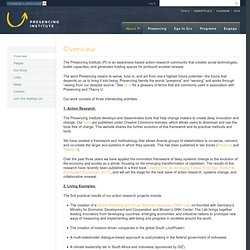
The word Presencing means to sense, tune in, and act from one’s highest future potential—the future that depends on us to bring it into being. Presencing blends the words “presence” and “sensing” and works through “seeing from our deepest source.” See here for a glossary of terms that are commonly used in association with Presencing and Theory U. Our work consists of three intersecting activities: 1. The Presencing Institute develops and disseminates tools that help change makers to create deep innovation and change.
We have created a framework and methodology that allows diverse groups of stakeholders to co-sense, reinvent, and co-create the larger eco-systems in which they operate. 2. The first practical results of our action research projects include: 3. About Human Development. The first Human Development Report in 1990 opened with the simply stated premise that has guided all subsequent Reports: “People are the real wealth of a nation.”
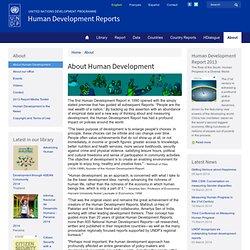
By backing up this assertion with an abundance of empirical data and a new way of thinking about and measuring development, the Human Development Report has had a profound impact on policies around the world. "The basic purpose of development is to enlarge people's choices. In principle, these choices can be infinite and can change over time.
People often value achievements that do not show up at all, or not immediately, in income or growth figures: greater access to knowledge, better nutrition and health services, more secure livelihoods, security against crime and physical violence, satisfying leisure hours, political and cultural freedoms and sense of participation in community activities. The past decades have seen substantial progress in many aspects of human development. Ronald Wright, author of "A Short History Of Progress" TEDxCalgary - Grant Neufeld - Communicating for Change. TEDxCalgary - Ken Low - Artifacts to Help Explain Human Learning Ecology. About HSP - Hidden Story Productions. Hidden Story Productions (HSP) helps people and organizations use documentary video as a tool to educate, engage and advocate on social issues.
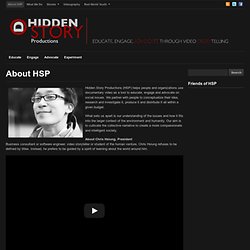
We partner with people to conceptualize their idea, research and investigate it, produce it and distribute it all within a given budget. What sets us apart is our understanding of the issues and how it fits into the larger context of the environment and humanity. Our aim is to cultivate the collective narrative to create a more compassionate and intelligent society. Short History of Progress Book Review. Leadership: Identity, Influence and Power (LEAD) Reflections on an Agentic Theory of Human Behavior - Senter for Kognitiv Praksis.
Albert Bandura Stanford University, California A world of accelerated social, informational, and technological changes provides people with expanded opportunities to bring their influence to bear on events that affect their lives.
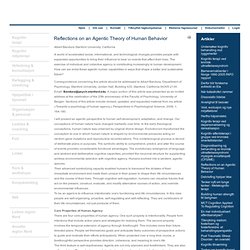
The exercise of individual and collective agency is contributing increasingly to human development. How can we enlist these agentic human capabilities in ways that shape a better and sustainable future? Correspondence concerning this article should be addressed to Albert Bandura, Department of Psychology, Stanford University, Jordan Hall, Building 420, Stanford, California 94305-2130. Email: Bandura@psych.stanford.eduDenne e-postadressen er beskyttet mot programmer som samler e-postadresser. Chapter 1: Pedagogy of the Oppressed. This reading is from: PEDAGOGY OF THE OPPRESSED by Paulo Freire.
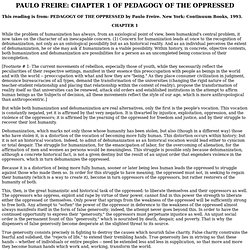
New York: Continuum Books, 1993. While the problem of humanization has always, from an axiological point of view, been humankind's central problem, it now takes on the character of an inescapable concern. (1) Concern for humanization leads at once to the recognition of dehumanization, not only as an ontological possibility but as an historical reality. And as an individual perceives the extent of dehumanization, he or she may ask if humanization is a viable possibility.
Within history, in concrete, objective contexts, both humanization and dehumanization are possibilities for a person as an uncompleted being conscious of their incompletion. But while both humanization and dehumanization are real alternatives, only the first is the people's vocation. Because it is a distortion of being more fully human, sooner or later being less human leads the oppressed to struggle against those who made them so.
[Footnote #6: 6. Helle%20N%20wp_internationalisering. Reflecting on Effectual Entrepreneuring Pedagogy. I have the privilege of teaching a great group of Human Centered Design and Engineering graduate students at the University of Washington in the course “Designing a Human Centered Venture.”
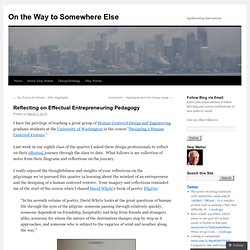
Last week in our eighth class of the quarter I asked these design professionals to reflect on their effectual journey through the class to date. What follows is my collection of notes from their diagrams and reflections on the journey. I really enjoyed the thoughtfulness and insights of your reflections on the pilgrimage we’ve pursued this quarter in learning about the mindset of an entrepreneur and the designing of a human centered venture.
Your imagery and reflections reminded me of the start of the course when I shared David Whyte’s book of poetry Pilgrim: I was reminded of the connection between “Camino” and the effectual path when I encountered Ann Patchett’s What Now? Other excerpts from What Now? “There’s a time in our lives when we all crave the answers. The Task Inbound Marketing Team Diagram. How Will You Measure Your Life? Editor’s Note: When the members of the class of 2010 entered business school, the economy was strong and their post-graduation ambitions could be limitless.
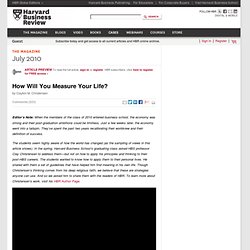
Just a few weeks later, the economy went into a tailspin. They’ve spent the past two years recalibrating their worldview and their definition of success. The students seem highly aware of how the world has changed (as the sampling of views in this article shows). In the spring, Harvard Business School’s graduating class asked HBS professor Clay Christensen to address them—but not on how to apply his principles and thinking to their post-HBS careers. The students wanted to know how to apply them to their personal lives. Before I published The Innovator’s Dilemma, I got a call from Andrew Grove, then the chairman of Intel.
I insisted that I needed 10 more minutes to describe how the process of disruption had worked its way through a very different industry, steel, so that he and his team could understand how disruption worked. The Human Venture. Limitations of science and adapting to Nature. Limitations of science and adapting to Nature T N Narasimhan Department of Materials Science and Engineering, Department of Environmental Science, Policy and Management, 210 Hearst Memorial Mining Building, University of California, Berkeley, CA 94720-1760, USA Email: tnnarasimhan@LBL.gov 1.
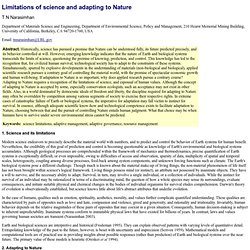
Tools and Resources for Assessing Social Impact. Appreciative inquiry. Inquiring Appreciatively in Albuquerque By Kim Hansen (A Two-Part Article on an Appreciative Inquiry conference attended in Albuquerque, written for the Front Range Chapter of the International Society for Performance Improvement) Part 1 What is AI?
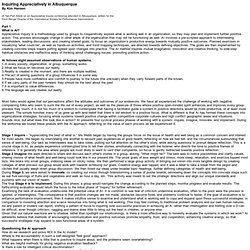
Appreciative Inquiry is a methodology used by groups to cooperatively explore what is working well in an organization, so they may plan and implement further positive action. This process encourages change in other areas of the organization that may not be functioning as well. AI involves a pre-scripted approach to interviewing stakeholders, leading discussions, and creating shared goals, to focus an organization’s productive energy towards mutually positive outcomes. Engaging_Stakeholders_Guide.
Ecosystems_human_wellbeing. Human-Centered Design Toolkit. For years, businesses have used human-centered design to develop innovative solutions.
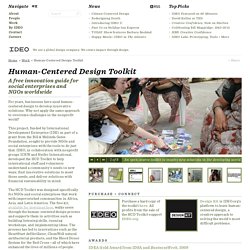
Why not apply the same approach to overcome challenges in the nonprofit world? This project, funded by International Development Enterprise (IDE) as part of a grant from the Bill & Melinda Gates Foundation, sought to provide NGOs and social enterprises with the tools to do just that. IDEO, in collaboration with nonprofit groups ICRW and Heifer International, developed the HCD Toolkit to help international staff and volunteers understand a community’s needs in new ways, find innovative solutions to meet those needs, and deliver solutions with financial sustainability in mind. The HCD Toolkit was designed specifically for NGOs and social enterprises that work with impoverished communities in Africa, Asia, and Latin America. About. - human. (Human Ventures) : human. (Human Ventures)
Human Ventures (Human) is a leading creative and social enterprise. We develop community programs and provide creative services that enable people to change their world (for the better). Ken’s Presentation on the Developmental logic of the human venture framework. Hello Everyone, As a way of letting the knowledge that Ken shared at the program committee be shared with everyone, I suggest that those people at the meeting post some of their notes and observations of the presentation and discussion. That way we will have many different views that will hopefully capture the whole picture. Below are my notes from the evening as a starting point. Introduction to the Human Venture Framework.